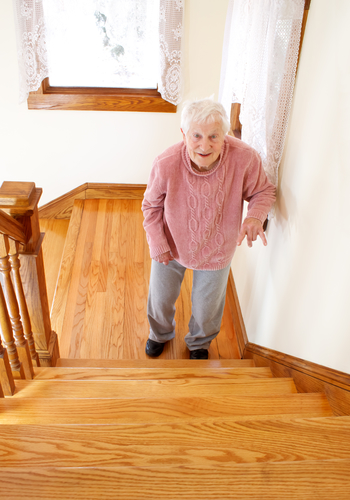We all know seniors who are determined to continue to live on their own. Many of them are capable and successfully independent. For a variety of reasons, there are still many seniors over the age of 65 who continue to be at risk while living alone. Many don’t have the financial means, family, friends, or other support systems to get the help they need. The U.S. Census Bureau reports 28% of people aged 65 or older lived alone as of 2010.
Mobility and Falls
What are the contributing factors to falls?
- Poor vision
- Poor balance and problems walking
- Unsafe environment ( Things like clutter, lighting, loose rugs, broken steps, no handrails)
- Lower vitamin D deficiency (Weakens bones)
- Lower body Weakness
- Incorrect medication levels causing dizziness or sleepiness
- Unsafe lighting
- Install emergency response system so if a fall occurs someone is contacted.
What you can do decrease the incidence of falls
- Talk to a doctor about your risks of falling.
- Make sure lighting at home is good to increase their ability to see and avoid hazards.
- Be sure their medications are appropriate.
- Have your doctor arrange a home safety evaluation with a healthcare professional (an occupational therapist or geriatric care manager) to see if grab bars, railings or other adaptive equipment is indicated (especially in the kitchen, bathroom, and stairways). There may be some additional simple home renovations that can be done to make the home a safer place.
- Do doctor-approved exercises to maintain lower body strength, balance, and endurance.
Nutrition
Factors like limited mobility, endurance, low finances, and cognitive problems can result in poor nutrition. Spoiled food, junk food, or no food in the kitchen of a senior loved one is a warning sign. Weight loss or weight gain can create additional medical problems. Depression and social isolation can cause loss of appetite. Aging and illness can impact the ability to taste food.
How to Help
- Arrange for groceries to be delivered.
- Have a family member, friend, neighbor, or health professional do regular checks or bring in food.
- Have a product like Ensure available for a healthy way to quickly get nutrients.
- Have your senior invite people over to enjoy a meal with others. Company can bring the food.
- Arrange for your senior to have regular, safe transportation for groceries.
- Have them attend senior program that offers meals.
Medication Errors
Seniors are often on several medications. Some have serious side effects when they interact with other meds or are not taken in the proper dosage. Many seniors are seeing multiple doctors and don’t reveal this information resulting in potentially dangerous or deadly results. Cognitive and memory impairment can create errors as well.
Medication Management
- Have a trusted person go through the medicine chest. Make a list of all medications. Make sure they are still current.
- Have a weekly or monthly pill box with medications sorted out correctly. This should be monitored by a responsible party.
- Share this information with the primary care doctors to ensure the proper meds and doses are being ingested.
- Talk with pharmacist about proper medications and doses.
Cognition and Behavior
Diminished cognition is not an unusual aspect of the aging process. Memory, problem solving, abstract reasoning, are a part of cognition. Behaviors like agitation, abusive behavior, hallucinations are not normal. Contributing factors to behavioral problems can be poor nutrition, an untreated medical condition, or incorrect medication management. This is an especially challenging area for caregivers.
Managing Cognitive and Behavioral Problems
- When you notice behavior changes consult a physician to ensure there are no undetected medical or medication issues.
- Don’t argue around behavioral or memory issues. Try to distract your loved one onto something else.
- Anxiety, agitation, anger, depression may be lessened with medication.
- Don’t take the behavior personally. Remember it is about their functional losses not about you.
- Use gentle coaxing and empathy when possible.
- Help create a safe environment with structure and scheduled regular events at the same time.
- Use written reminders if appropriate as cues to help your loved one remember necessary events.
- If these problems escalate you may need to consider a placement out of the home or additional home care assistance.
LEARN TO LOVE YOUR LIFE AGAIN
 Do you feel like you need to hit the REFRESH button on your life? Download our free guide and begin to create your best life yet!
Do you feel like you need to hit the REFRESH button on your life? Download our free guide and begin to create your best life yet!




Trackbacks/Pingbacks